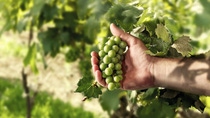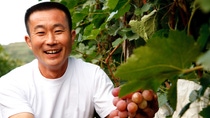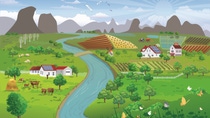Go to the countryside - Yunyan’s story
The problems and challenges confronting China’s agriculture sector are best learned by visiting the countryside.The agriculture team of BASF Greater China not only helps them with various planting problems at the frontline, but also guides them on how to protect the environment and how to grow safe and high-quality crops.
Kunming, the middle region of Yunnan province, is a major vegetable planting base for China. Zhu Yunyan, sales representative, Crop Protection Greater China, BASF, came from a rural area nearby. Three years ago when she paid a visit to Chengjiang County, an important vegetable base of Kunming, she was treated as a “total stranger” by the site managers. “Cucumber growers in Chengjiang knew very little about BASF back then. To them, products from foreign companies meant ‘expensive’.”
Aware of their resistance, Zhu stopped introducing BASF and its products. Instead, she asked to pay a visit to the cucumber base. Despite their reluctance, the manager showed her to the plant garden. It was in
October during the peak season of fungal diseases and Zhu found the plant leaves yellowing and falling off. “In my judgment, cucumbers here have been caught with downy mildew and major outbreaks were expected,” she recalled. However, the site manager did not believe her and insisted that it was just some kind of bacterial angular leaf spot disease. The two diseases have similar early symptoms found on the leaf blades. It is quite difficult to tell apart without sufficient expertise and experiences. And they require totally different therapies.
Zhu left sample medicines with the manager without further explanation and asked him to provide some feedback on the trials. Three days later she received a call from the cucumber base and was told the medicine was “marvelous”. They even conducted a comparative study with the similar products, but the BASF solution stood out with overwhelming results. That was how BASF gained entry into the Chengjiang cucumber growing market. Since then, the company’s agricultural solutions have been welcomed and trusted by local growers.
“I was deeply touched by this episode. Using my own professional competence and wisdom to help farmers out of problems made me feel more like a professional plant doctor rather than a salesperson,” said Zhu of the experience.
“Using my own professional competence and wisdom to help farmers out of problems made me feel more like a professional plant doctor rather than a salesperson.”
Zhu Yunyan, sales representative, Crop Protection Greater China, BASF
In March 2009, Zhu, a fresh agriculture major graduate, became an intern at the BASF Crop Protection division at Yunnan. BASF, at the time, was still a new comer to the China agricultural market with Zhu’s team only having three members, including a sales manager. “BASF helped me a lot. Although I was an agriculture major, my book learning was quite different from what was needed in actual work,” Zhu said. “We took a series of trainings after entering BASF and the most impressive part was our crop protection experts showing us in the fields how to differentiate between various diseases and how to grow and manage crops in a scientific way.”
In four years’ time, Zhu’s team has grown to over 20 members, with the sales income increasing ten times. However, what Zhu cares about most is the rising awareness of BASF brand among local farmers.
Yuanmou County in Chuxiong is an important tomato and sweet pepper growing area of Yunnan. Other foreign brands were long established before BASF’s entry into the local market. Practically no one had ever heard of BASF when the crop protection team entered Yuanmou market. Some people even asked “BASF (pronounced as basifu in Chinese), or Master Kong (kangshifu, a food brand from Taiwan)?” (Si and shi have the same pronunciation in Yunnan dialect).
Zhu and her team made continuous efforts to raise the BASF brand awareness and spread the company message by word of mouth among the local growers. They showcased product efficacy and provided customized solutions to control specific diseases at various farmer gathering events, while teaching planting and therapy skills.
“Now farmers will come to our employees in their BASF uniforms to ask questions about growing,” Zhu said. “They said our products and services are the best – we are very proud of this. In fact, BASF brands are well established in the rural area of Yunnan.”
Most of the time Zhu is in the field or retail shops instead of her office. She deals with three kinds of customers: professional co- operatives, growing bases and individual growers. Professional cooperatives are organizations with high level of expertise and management, procuring materials and agricultural means of production in a centralized way. They have the most government support. Growing bases are voluntary cooperative communities consisting of several growers owning scores or hundreds of mu (one mu equals 0.0667 hectares) of land. Individual growers typically own less than two dozen mu.
“Individual growers, accounting for half of our customers, have relatively lower level of expertise and management, and they are the most interesting group,” Zhu said with a smile. The majority of individual growers are teenagers graduating from middle school, 40- or 50-year-old rural housewives and 70- or 80-year-old “left-behind elderly”, characterized by poor education and a lack of growing and management expertise. “Communication with them requires language which they can understand,” Zhu said.
And this group is also the most price- sensitive, which presents a challenge for Zhu in communication. “We will sit together to do some calculations. For example, how much costs can be reduced or how many yields can be increased through one-time investment?”
AgCelence® is a BASF crop protection product to improve crop immunity and resistance to environmental changes. However, it is considered an unacceptable “additional” cost to ordinary growers who traditionally believe in “hot fixes”.
“I often compare plants to people and tell them a person has to be physically strong to better resist diseases, so are crops.
AgCelence is more like ‘health care products’ for the crops,” Zhu said. “This really worked out for them. They even think of their crops when weather changes.”
Although our top priority is to sell BASF products and solutions, BASF Crop Protection team has been making substantial effort to help Chinese farmers improve their yields and quality. For instance, Cabrio Top Big Caravan Project has offered free training in growing technologies and managerial experience to farmers. In April, the customer training was provided at the banana growing base of Yunnan in which Philippine experts were invited to share their experiences on growing and brand building. “Through this training, banana suppliers realized that it took quality and branding to make their product more valuable,” Zhu noted.
In addition to her job promoting BASF products and solutions, Zhu is also an “ambassador of food safety and environment Protection”. “When farmers are driven by short-term economic benefits and yields to use highly polluting and residual chemical fertilizers and pesticides, we will share with them the negative impacts on soils and persuade them to consider the future development of the next generations,” she said. “We are not experts and may not be the best persuader, but we will do our best. Farmers are easy to satisfy – they expect nothing more than a good yield and stable income.”



